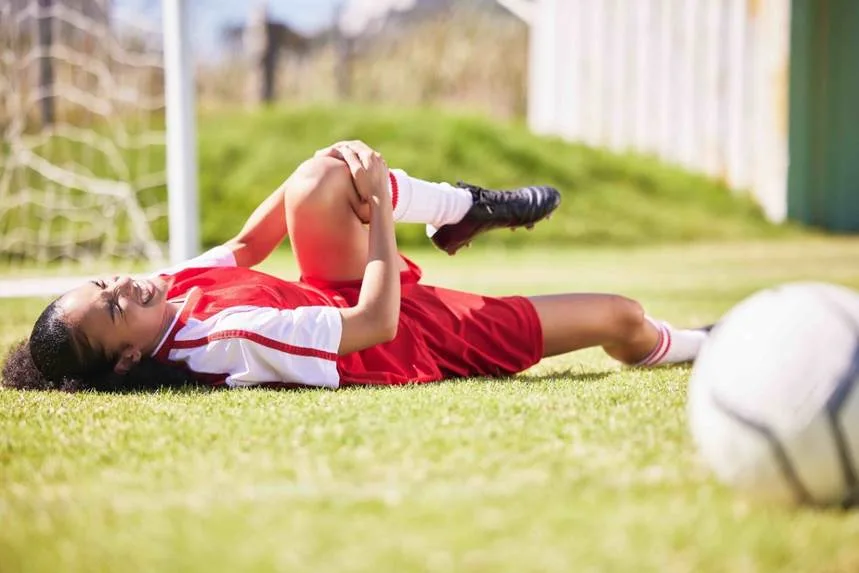More women and girls are participating in sports than ever before. The positive impact of which extends beyond the field of play, and promotes an active lifestyle at any age.
Yet, it has also led to a rise in orthopedic injuries among women.
Injuries and Menstrual Cycles
During a person’s menstrual cycle, hormonal fluctuations, primarily involving estrogen and progesterone, occur. These hormones can impact ligament and tendon laxity, muscle strength, and coordination.
Some studies have suggested that people are most susceptible to injury during the ovulatory phase. Yet, others report the luteal phase (after ovulation), when progesterone levels are higher, to be associated with an increased injury risk due to potential effects on neuromuscular control and ligament laxity.
Professional female athletes are more prone than men to suffer common sports-related injuries that in many instances impact and shorten their playing career.
Female athletes are two to eight times more likely than men to tear an ACL, which is usually the result of a twisting of the leg while applying downward pressure. So too are ankle sprains, and stress fractures are more common in female athletes.
Since 2021, at least 87 players from eight of the world’s top women’s soccer leagues have torn their anterior cruciate ligaments (ACLs). Soccer stars like the USA’s Catarina Macario, Dutch forward, Vivianne Miedema and England’s Beth Mead and Leah Williamson have all fallen victim to ACL injuries, which take 10 months or longer to heal. Well-known tennis player Serena Williams has faced various injuries throughout her career, including knee and ankle issues.
Injuries and Hormones
There is currently no consensus on why ACL injuries are so prevalent in women. Yet, experts suggest it could be due to differences in anatomy, biomechanics, neuromuscular control, training, and conditioning, including hormones.
Some studies have proposed that ACL laxity changes throughout the menstrual cycle, and eliminating the changes in estrogen using oral contraceptives reduces the risk of ACL rupture.
Hormonal contraceptives regulate hormone levels in a woman’s body, including estrogen and progesterone. These hormones can influence ligaments and tendon laxity, affecting injury risk. Estrogen, in particular, is believed to play a role in maintaining ligament and tendon integrity and has shown a potential protective effect.
Yet, the relationship between hormonal changes and injury risk is complex. It can be influenced by various factors, including individual variability, type of sport, training intensity, and more. It’s also equally important to note that every woman’s experience with her menstrual cycle is unique. The impact of hormonal contraceptives can vary among individuals due to differences in hormonal response, genetics, and other factors. So, it is not a one-size-fits-all solution.
Contraceptives and Injury Prevention
A female athlete may be considering using hormonal contraceptives for potential ACL injury prevention. If so, they need to consult with a medical professional, such as a gynecologist or sports medicine specialist. They will be able to provide personalized advice based on the athlete’s medical history, current health, and athletic goals.
The field of sports medicine is always evolving. Research into the relationship between hormonal contraceptives and ACL injuries is ongoing. New insights and recommendations may emerge as more studies are conducted. While hormonal contraceptives might have a role to play, athletes should focus on a comprehensive injury prevention strategy. This includes proper strength and conditioning training, neuromuscular control exercises, and technique refinement to reduce ACL and other injury risk.
It’s important to keep in mind that injury risk is influenced by various factors. Hormones are just one piece of the puzzle.
Who is the author?
René Schickerling is a highly driven strategic & collaborative Product Manager who heads up Pharma Dynamics’ women’s healthcare division.
Schickerling has 18 years of experience in the Pharmaceutical industry in various therapeutic areas including Female Healthcare, Pain, Respiratory, CNS, Endocrinology, Neurology, Urology & Anti-infectives. Multi-Channel Marketing; Digital Marketing.
Schickerling qualifications include IMM Project Management, Honours Degrees in Clinical and Industrial Psychology from North-West University/Noordwes-Universiteit and being an HCPSA Registered Psychometrist.





![women [longevity live]](https://longevitylive.com/wp-content/uploads/2020/01/photo-of-women-walking-down-the-street-1116984-100x100.jpg)









